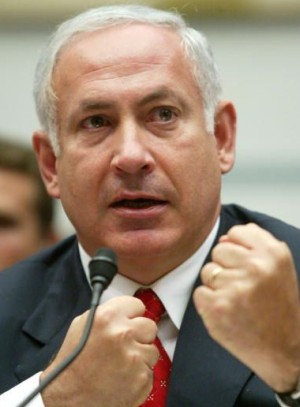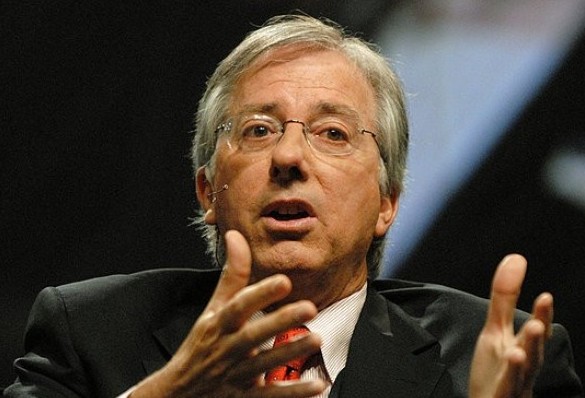
A Jewish settler tosses wine at a Palestinian woman on Shuhada Street in Hebron, the West Bank.
Four years ago, Rory Stewart wrote:
A great many of the failures in Afghanistan and Iraq arise from a single problem: the American-led coalitions’ lack of trust in local politicians. Repeatedly the Western powers, irritated by a lack of progress, have overruled local leaders, rejected compromises and tried to force through their own strategies. But the Westerners’ capacity is limited: they have little understanding of Afghan or Iraqi politics and rely too heavily on troops and money to solve what are fundamentally political and religious problems.
The coalitions cannot achieve political change in the absence of strong local support. And when they try to do so, they undermine their local allies. Iraqi and Afghan national and regional leaders have a far better understanding of the limits and possibilities of the local political scenes; they are more flexible and creative in finding compromises; and unlike the coalition officials, they are elected. They must be given real power and authority. This may seem an obvious prescription — but in fact the coalitions are not allowing it to happen.
Underneath the lack of trust that Stewart correctly identified, is a more fundamental issue: the hubris of power.
We have the guns, the cash, and represent the most powerful nation on Earth. You need to respect us but we really don’t need to respect you. Respect is something we expect but will also on occasions dish out if or when it seems expedient.
Americans, shaped by a culture that tends to place a higher value on power than anything else, are inclined to view respect as simply an element in a power equation. In one situation respect might seem essential, in another merely useful, and in yet another it can be dispensed with. Rarely is it held up as the most vital component in all human relationships.
After President Obama showed up in Kabul just over a week ago, President Karzai showed his uninvited guest and paymaster the courtesy of inviting him to dinner. Obama, the New York Times tells us, returned the courtesy with a thank-you note. “It was a respectful letter,” General James Jones, Obama’s national security adviser told reporters.
The significance of this incident, supposedly, is that it signals an overdue change in tone as the administration registers that its repeated admonitions of the Afghan president have proved counterproductive.
Ironically, an American president whose arrival in office was supposed to herald an historic shift in America’s approach to the world — one which would reinstate the value of soft power — has been a surprisingly clumsy diplomat.
So, if the White House now understands that it must not underestimate the value of respectfulness, that’s a good thing — but let’s not pretend a thank-you note is all it takes.
* * *
Respect is one of those words we use so often we rarely pause to consider its meaning. It describes an attitude, yet its latin root, specere, to look, indicates that this is really a form of attention.
To be respectful is to attentively incline oneself towards the other in recognition of their autonomy and integrity.
There is no one we can respect and simultaneously try to change. When we coerce or manipulate someone, we cannot respect them because our attention is focused not on them but on what we want.
If one views respect as a resource, nowhere is it generally more scarce than among the powerful.
The conceit of power is that power elicits respect, when in truth the tokens of respect bestowed on the powerful are rarely more than expressions of fear, envy or duty. (Hence an underlying paranoia haunts the powerful: they know they are the beneficiaries of a social investment that could, if things turn sour, be swiftly withdrawn.)
Respect is not the fruit of power, but on the contrary, it is a self-propagating virtue that becomes mirrored through its own expression.
Meanwhile, behind what might sound like an overly abstract reflection on respect, another topic floating in the background is Israel, since if one drills to the core of the Middle East conflict, it cannot be reduced to land or religion. It’s about respect.
Can Jews who claimed their “birthright” by dispossessing hundreds of thousands of Palestinians, somehow make peace with those people and their descendants without also acknowledging the Palestinians’ rights to dignity and respect? Yet can such respect be conferred without also calling into question the legitimacy of the Jewish state?
Where is the actual ground for mutual respect when the affirmation of one people’s rights has for six decades depended on the denial of another’s?
 I claim no special knowledge of the inside workings of the Obama administration — merely an ear that notes the difference between substance and flatulence and to my ear what sounded like a farting contest started on April 7 with a column by David Ignatius: “Obama weighs new peace plan for the Middle East.”
I claim no special knowledge of the inside workings of the Obama administration — merely an ear that notes the difference between substance and flatulence and to my ear what sounded like a farting contest started on April 7 with a column by David Ignatius: “Obama weighs new peace plan for the Middle East.”
 Time was when Nazis used to slather swastikas on synagogues and Jewish businesses to prepare the local population for expulsion or much worse. It’s sad that this sort of behavior persists around the world, as a new study by Tel Aviv University shows. But it’s even sadder to see Israelis regularly defacing Palestinian property with Stars of David with equal glee and with what appears to be the same brain-dead mindset.
Time was when Nazis used to slather swastikas on synagogues and Jewish businesses to prepare the local population for expulsion or much worse. It’s sad that this sort of behavior persists around the world, as a new study by Tel Aviv University shows. But it’s even sadder to see Israelis regularly defacing Palestinian property with Stars of David with equal glee and with what appears to be the same brain-dead mindset.

 Which way will Bibi go? This seems to be the big question – whether Prime Minister Binyamin Netanyahu will bow to American pressure, exchange his right-wing/religious government for a “peace coalition” and start taking down the occupation, or whether he will dig in.
Which way will Bibi go? This seems to be the big question – whether Prime Minister Binyamin Netanyahu will bow to American pressure, exchange his right-wing/religious government for a “peace coalition” and start taking down the occupation, or whether he will dig in. David Cronin: Have you completely rejected Zionism?
David Cronin: Have you completely rejected Zionism?
